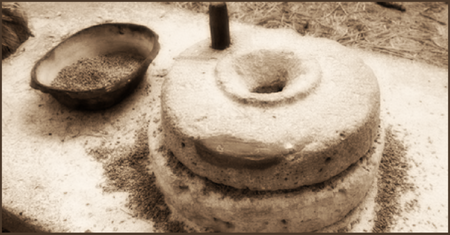We speak of God’s word as sublime. In this we acknowledge both that the word of God is understandable, and that it is unfathomably deep and productive as we study it each day. The simplest of babes can derive from it the “words of eternal life” (John 6:68), and yet the ablest of students can spend a lifetime of learning from it each day.
Lessons can be learned from unexpected places. For example, we can learn much from the Bible’s reference to the millstone. The millstone was extremely important in ancient times. To turn grain into flour, the grain would be crushed into powder between two heavy stones. Smaller versions of such stones were found in the homes of the people. Larger stones were fashioned in ancient societies to increase production. Regardless, as the Bible refers to such millstones, there are three thoughts to keep in mind. First, they were necessities. Second, they were hard. Third, they were heavy. With this in mind, consider the following truths:
The millstone is not to be taken in pledge. “No man shall take the lower or the upper millstone in pledge, for he takes one’s living in pledge” (Deuteronomy 24:6). Under the Old Law, there were many restrictions given regarding the lending of money, and debt. For example, under the Law, interest could not be charged when money was lent (Deuteronomy 23:19-20). Every fifty years there was a year of Jubilee, designed to benefit the poor, and relieve burdens.
Our text is similar to another restriction given in the lending of money. “If you ever take your neighbor’s garment as a pledge, you shall return it to him before the sun goes down. For that is his only covering, it is his garment for his skin. What will he sleep in? And it will be that when he cries to Me, I will hear, for I am gracious” (Exodus 22:26-27). Consider the protection God supplies for the poor. His garment (cloak) is all he has. To take it in pledge, will cause him to suffer. The same is true with the millstone. To take the millstone in pledge would be to deprive him of the ability to feed himself. No millstone, no flour — no flour, no bread.
The lesson is an outgrowth of God’s call for us to love one another. “For all the law is fulfilled in one word, even in this: ‘You shall love your neighbor as yourself ’” (Galatians 5:14). Exodus 22:27 tells us that God is gracious. He requires the same of us.
A millstone is likened to a hard heart. In Job 41, the Lord told Job about a menacing beast of the sea referred to as the Leviathan. He is large and uncontrollable. “Indeed any hope of overcoming him is false” (9). We don’t know what this beast was. The description does not match any animal or fish that exists in our time. As a part of the description of this creature God said, “His heart is as hard as stone, even as hard as the lower millstone” (24). This seems to indicate an intemperate nature, as men quail as the Leviathan rages against hem.
The image of a hard heart is used to describe those who are untouched by sentiment and righteousness. They exhibit no concern for others. They are untouched by God’s demand to obey or to repent. The Pharoah who oppressed the Israelites is an example. Even through all the plagues sent by God to convince Pharoah to let Israel Egypt, we are told “So the heart of Pharoah was hard; neither would he ltet the children of Israel go…” (Exodus 9:35).
Christians must not have hard hearts. This would be as the profane, as described by Paul in Ephesians 4:18, “They are darkened in their understanding, alienated from the life of God because of the ignorance that is in them, due to their hardness of heart” (ESV). The heart of the Christian is to be pure and receptive. “Blessed are the pure in heart, for they shall see God” (Matthew 5:8).
The millstone is used to describe the seriousness of offending others. In Judges 9:53 we are told that Abimelech was mortally wounded during a siege against the city of Thebez when a “woman dropped an upper millstone on Abimelech’s head and crushed his skull.” This was a judgment upon the man, from God Himself (cf. Judges 9:56). The weight and hardness of the stone was devastating when dropped from the height of that “strong tower.”
It is not surprising that Jesus would use the weight of the millstone to make a point about God’s response to the sin of offense. The point is recorded in Matthew 18, Mark 9 and Luke 17. “Whoever causes one of these little ones who believe in Me to sin, it would be better for him if a millstone were hung around his neck, and he were drowned in the depth of the sea. Woe to the world because of offenses! For offenses must come, but woe to that man by whom the offense comes!” (Matthew 18:6-7).
Here imagine having such a heavy stone hung around the neck, and being thrown into the sea. One would “sink like a stone.” In May of 2016 the body of a gang member was found washed up on beach in Brooklyn, New York. His feet were encased in concrete. (An example of “cement shoes” said to be a way of execution by the mob or mafia). It would be a horrible way to die. Pulled inexorably down by the weight, with no way to extricate oneself, and no way to overcome the weight of the stone.
Love one another, repent, and do not cause offense. These are some important lessons that are learned from the simple millstone.





